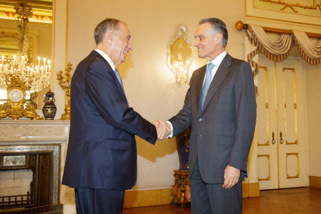

Routes of the Future
The Presidency of the Republic has decided to celebrate the 40th Anniversary of 25th April 1974 with an International Conference whose theme will be the April Routes, focused on the Spirit of Democracy, the Culture of Commitment and the Challenges of Development.
This is the third Conference to be held within the scope of the ROUTES OF THE FUTURE, an initiative that intends developing a reflection concerning the great challenges that are placed before Portuguese society. The first of these conferences was dedicated to the debate over the scenarios of demographic development, particularly the phenomenon of fertility and population growth. The second was focused on the strategic positioning of Portugal within European and World equilibrium, identifying historical trends and the opportunities for insertion in the economy and into the main axes of global development.
During 2014, the Presidency of the Republic intends celebrating April in its 40th Anniversary, inviting all Portuguese to reflect upon the new paths that they intend to tread, in order to materialize the spirit that presided to the establishment of democracy in Portugal.
The model of the conference will recur to the confrontation of the perspectives of those who, from abroad, observe Portugal and of those who, in the Country, have developed innovative and prospective thinking over the issues of Portuguese society. Thus each panel will comprise a foreign guest and a Portuguese guest, who will approach the three thematic axes, identified here by the April Routes: democracy, commitment and development.
In the axis of democracy it is intended to identify the “spirit” of the founding ideals of the democratic regime, expressed in the construction of a citizenry in which new dimensions will deserve special mention: firstly, the European dimension, that places before us the challenge of thinking of the Portuguese as European citizens; secondly, the environmental dimension, a fundamental prop of civic conscience and responsibility surrounding the idea of sustainability; lastly, the changes that lead to the strengthening of a civic culture, an indispensable condition in the quality of democracy.
The second axis will be focused on the culture of commitment as an indispensable prop to the development of the regime, to governability and to the increase in civic confidence, whether between politicians and institutions or in the image that citizens have of these politicians and institutions. There is a clear difference between consensus and commitment: the former results from the convergence of concepts over the solutions to be adopted and the cultural standards that guide political activity; in its turn, the culture of commitment becomes possible and desirable when politicians value dialogue and consonance in positions that identify with national interest, without abdicating from the diversity of principles and convictions that guide their action.
Lastly, the third axis of reflection is dedicated to Portugal’s development, with particular regard to the challenges placed by the emergence of a society of knowledge, specifically: the impact of the value of knowledge on productive structures and the competitiveness of Portuguese companies in the global market; the training profiles of the new generations susceptible to enable them to face such challenges; and the possible specialization standards that enable the innovation and competitiveness of the Portuguese economy.
na cultura de compromisso como base indispensável ao desenvolvimento do regime, à governabilidade e ao aumento da confiança cívica, quer entre os agentes políticos e as instituições, quer na representação que os cidadãos fazem desses agentes e instituições. Há uma clara diferença entre consenso e compromisso: aquele resulta da convergência de conceções sobre as soluções a adotar e as matrizes culturais que orientam a ação política; por seu turno, a cultura de compromisso torna-se possível e desejável quando os agentes políticos valorizam o diálogo e a concertação de posições que se identifiquem com o interesse nacional, sem abdicarem da diversidade dos princípios e convicções que orientam a sua ação.
Por último, o terceiro eixo de reflexão é dedicado ao desenvolvimento de Portugal, com particular atenção aos desafios colocados pela emergência de uma sociedade do conhecimento, nomeadamente: o impacto do valor do conhecimento sobre as estruturas produtivas e a competitividade das empresas portuguesas no mercado global; os perfis de formação das novas gerações suscetíveis de as capacitarem para enfrentar esses desafios; as matrizes de especialização possíveis que potenciem a inovação e a competitividade da economia portuguesa.
© 2006-2016 Presidency of the Portuguese Republic
You have gained access to the records of the Official Site of the Presidency of the Republic from 9 March 2006 to 9 March 2016.
The contents available here were entered in the site during the 10 year period covering the two mandates of President of the Republic Aníbal Cavaco Silva.